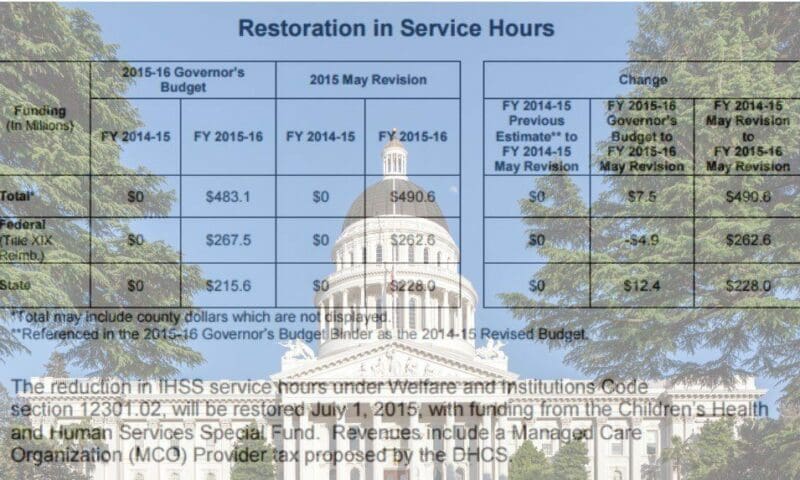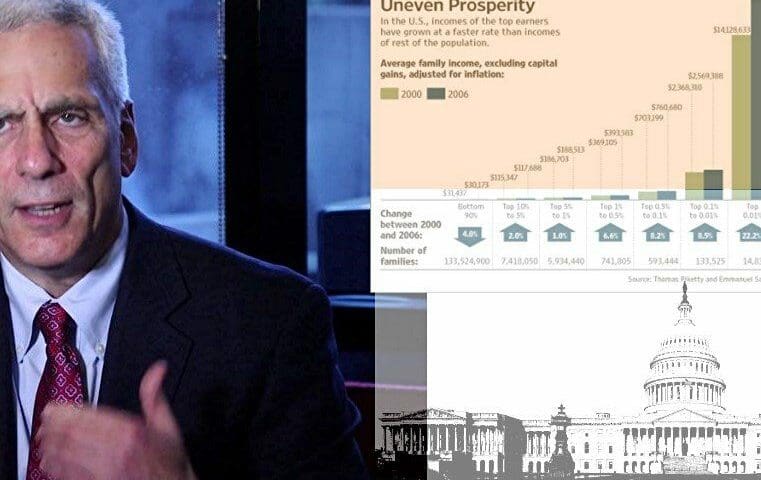

Los Angeles County Supervisor Mike Antonovich has hired a corporate-sponsored lobby group and PR firm to conduct a so-called “study” of the minimum wage.
Under Antonovich’s orders, the County is going to pay $55,000 to the Washington, D.C.-based Employment Policies Institute (EPI) to help him undermine a plan to create a countywide minimum wage that would reach $15 an hour by 2020, similar to the one recently passed by the City of Los Angeles. The policy would cover about a million employees in the unincorporated areas of the nation’s largest county.
Any one of the supervisors can authorize the county’s CEO to commission an analysis of a policy being considered without a vote from the other four members. That’s what Antonovich — who chairs the board meetings and prefers to be called the county’s “mayor” — did at the end of June.
Antonovich asked EPI to do extensive research on for-profit and nonprofit employers in the county’s unincorporated areas –
» Read more about: Meet Mike Antonovich's Minimum Wage Hitman »


If it becomes law, a reform bill now in the state legislature will mark a milestone in the two-year effort to rein in the secretive but powerful private organization responsible for accrediting California’s 112 public community colleges. The target of Assembly Bill 1397 is the Accrediting Commission for Community and Junior Colleges (ACCJC), which was recently thwarted from terminating the accreditation of the City College of San Francisco (CCSF), mostly for issues stemming from the academically high-rated school’s Great Recession-battered finances.
The political firestorm sparked by the unelected commission’s effort to effectively close CCSF turned a spotlight of publicity on the darker policy corners of the commission, revealing an almost comically rogue culture of nepotism, free-market radicalism and mandarin indifference to the lives of students and teachers. But now the commission finds itself caught in that light once more,
» Read more about: Teaching Moment: Will Sacramento School College Accreditors? »


The nurses who showed up at state Senator Richard Pan’s Capitol office in May were furious. They had been assured by Pan, a Democrat from Sacramento, that he would be on their side when it came time to vote on Senate Bill 346, a charity care measure aimed at providing transparency to the state’s currently murky rules governing tax-exempt status for nonprofit hospitals.
But Pan, a physician who has risen to prominence this year as the sponsor of a mandatory school vaccination bill, abstained when the bill came up for a vote in the Senate’s health committee, effectively killing it when it fell one vote short of passing in that committee on April 29. The nurses alleged that the bill died because Pan withdrew his promised support after heavy, last-minute lobbying by the California Hospital Association (CHA). Pan’s spokesperson, Shannan Martinez, later issued a denial,
» Read more about: The Persuaders: California Hospital Association »


Here’s something you probably didn’t know happened in California in the last few years, and maybe it’s something you never imagined could happen: In 2011, two high-ranking state regulators were fired from their posts for pissing off the oil industry. No one really disputes the veracity of that statement; not even Governor Jerry Brown. “They were blocking oil exploration in Kern County,” the Sacramento Bee reported Brown announcing at an event six months later. “I fired them, and oil permits for drilling went up 18 percent.”
Catherine Reheis-Boyd, president of the Western States Petroleum Association, also celebrated without restraint, unconcerned that the people of California might detect her hand guiding the Governor’s pink-slip pen. After the firings, Reheis-Boyd boasted to the Los Angeles Times that her industry once again had a “clear pathway for people to get permits and proceed with drilling in this state.
» Read more about: The Persuaders: Western States Petroleum Association »


“Something always seems to be starting in California,” Angelo Amador, an attorney and vice president for the National Restaurant Association, told Bloomberg News.
It was 2012 and his remark was prompted by a California state Supreme Court decision favoring an employee’s right to have defined meal-break times. The association—dubbed “the other NRA” for its lobbying muscle, with annual revenues of $71 million in 2013–had vigorously opposed policy that required employers to ensure that workers take rest and meal breaks rather than leaving it to the employees to push back against managers to enforce break provisions.
Amador’s NRA is perhaps the largest trade group that you have never heard of, and supports an “institute” run by a PR firm that churns out opinions and papers to shape policy debates.[divider]
Also read these stories in our “Persuaders”
» Read more about: The Persuaders: California Restaurant Association »


Ever wonder how a bill doesn’t become a law?
One week we’ll be hearing all about a proposed law intended to improve the quality of life for the majority of Californians, a bill that seemingly has on board every state Senator or Assembly member who cares about the environment, consumer rights or worker safety. Then, suddenly – Poof! – the next thing we know, the legislation has been killed in committee or withdrawn by its sponsor.
Whenever we hear of these kinds of Sacramento stories, we might assume it’s the work of the Chamber of Commerce. After all, the CalChamber is the state’s big guard dog defending corporate interests by placing long-overdue bills on its dreaded Job Killer list. But the Chamber isn’t the only bully on the block – it often has help from a gang of powerful lobbying organizations that represent the individual interests of very specific industries.
» Read more about: Today: “The Persuaders” Looks at Corporate Lobbying »


The Supreme Court’s ruling Friday to legalize same-sex marriage is a victory for human rights and an occasion to rejoice. The decision follows in the footsteps of the Supreme Court’s 1967 decision in Loving v. Virginia that outlawed states’ bans on interracial marriage, an earlier pathbreaking victory for marriage equality.
But there is a huge difference in the two rulings. The Loving decision on inter-racial marriage was unanimous. Friday’s ruling on same-sex marriage was a 5 to 4 decision. We should not forget that four members of the nation’s highest court — Chief Justice John Roberts and Justices Samuel Alito, Antonin Scalia and Clarence Thomas — opposed marriage equality. Each had his own reasons to justify his vote to himself and to the public, but history will record that all four of them supported states’ rights over equal rights, bigotry over tolerance. Justices Stephen Breyer,
» Read more about: Courting History: Why John Roberts Is No Earl Warren »


The first shot of What Happened, Miss Simone? shows a crowd applauding the appearance of a singer. After years of a self-imposed hiatus, Nina Simone walks onstage, and with one hand on a piano, bows. For a full 10 seconds. She then looks up and out at the rapturous audience. But she is not smiling. Her stare is intense. Some will see fear in her eyes. Others will see indifference. Others might even see loathing. Or all of it.
Once Simone sits at the piano and the applause ends, she does nothing for half a minute. The uncomfortable silence is finally broken by her softy saying “Hello” into the mic, only to be greeted by a fan shouting, “Hi. We are ready!” But is Simone? After seeing Liz Garbus’ documentary, an even better question is, “Was she ever?”
Unlike our modern commodified stars, Nina Simone’s life was a messy journey of discovery. » Read more about: Film Review: ‘What Happened, Miss Simone?’ »


Economist Jared Bernstein recently sat down with Capital & Main to offer his perspective on a wide range of political and income-inequality topics. Formerly a top advisor to Vice President Joe Biden and, currently, a senior fellow at the Center on Budget and Policy Priorities, Bernstein spoke to us again this week, following the U.S. Senate vote to fast-track the Trans-Pacific Partnership. The interview has been edited for brevity and clarity.
Capital & Main: What was your first, red carpet reaction to the Senate’s fast-tracking of TPP?
Jared Bernstein: I’m not that surprised but I’m not deeply disheartened or worried. What’s positive is that this time the text of the TPP will be in the public domain for two months before the ratification in Congress, and that will give lots of us a chance to take a closer look at it —
» Read more about: No Smiley Faces: Jared Bernstein on the TPP Juggernaut »


In two Thursday rulings the Supreme Court came down on the side of a functioning government that can help improve life prospects for Americans – should the people’s representatives so desire. While Californians wouldn’t have been immediately impacted had the Court undermined legislation on health care and housing discrimination, the implications could have been drastic down the road.
In upholding the Affordable Care Act, the High Court affirmed its role firstly to “say what the law is,” as Chief Justice John Roberts wrote in the majority opinion, citing Marbury v. Madison; and, secondly, to be guided in that endeavor by adhering to the overall plan of the legislation — rather than zeroing in on each textual clause viewed in isolation. In doing so, Roberts’ Court not only saved the landmark health care law at hand, but avoided creating the implication that major legislation could potentially be undone by a stray sentence or errant copyediting.


In what is being billed by unions, environmentalists and human rights groups as an endorsement of an unprecedented expansion of corporate power and privilege, the Senate today passed a cloture vote on a motion to concur with a trade promotion authority (TPA) bill passed by the House.
Cloture effectively clears the way for Wednesday’s expected vote on fast track itself, which will only require a majority for passage and is needed to speed through passage of President Obama’s secretive and controversial Trans-Pacific Partnership (TPP) trade agreement without filibuster or amendment.
TPP has been widely criticized for effectively granting extraordinary legal rights to corporations and investors that it does not extend to unions, public interest groups and individuals.
Today’s cloture vote was 60-37, the barest minimum needed for passage. Thirteen so-called Corporate Democrat senators voted yes — including California’s Diane Feinstein — one less than lined up behind May’s 62-37 senate approval of a bill that had combined TPA and Trade Adjustment Assistance (TAA).


The 467,000 Californians who receive assistance from the state’s In-Home Supportive Services are breathing a little better, if not easier, now that a new budget has restored care cuts to the agency. The program typically assists elderly, blind and disabled people on low incomes with housework, meal preparation, personal hygiene and other services; by paying individuals through the state to perform these tasks, the care recipients are able to remain in their homes and avoid being institutionalized – which also saves taxpayers millions of dollars.
Also Read: Will Sacramento Restore Home Care Cuts to Seniors & the Disabled?
A few years ago IHSS suffered a seven-percent funding cut that Governor Jerry Brown pledged in January to restore – but without providing a specific funding stream to do so. Brown suggested that revenue for the restoration could come from either a new tax on certain health care plans or from the state’s General Fund.
» Read more about: In-Home Care Recipients Cautiously Applaud New Budget »


When Jared Bernstein recently sat down with Capital & Main, he had just been chosen as chair of the National Employment Law Project’s board of directors, while continuing his roles as a senior fellow at the Center on Budget and Policy Priorities, and as a frequent commentator on MSNBC and CNBC. Picked in 2009 by Joe Biden to be the Vice President’s top economic advisor, Bernstein had already distinguished himself as a passionate critic of inequality during his long tenure at the Economic Policy Institute, one of the country’s leading think tanks. His views on economic issues were well to the left of Obama’s and the rest of the President’s team, ensuring that progressive ideas would get a hearing inside the White House as the administration wrestled with the worst downturn since the Great Depression.
While Obama and his advisors succeeded in reversing the Great Recession’s massive job losses and saving the bacon of the financial industry,
» Read more about: Watch Now: Jared Bernstein on Inequality & Lip-Syncing Republicans »


The problems are well documented. Northrop Grumman botched the upgrade to New York City’s 911 systems while billing the city $300,000 to $430,000 annually for each of their 137 consultants. A $132 million dollar contract to upgrade phones and Internet services for municipal agencies in Orange County, California is already $13 million over budget while municipal employees report repeated outages and failed solutions from the contractor, Xerox. And who can forget all those failed Obamacare exchange websites brought to us by mega-information technology contractors such as CGI and Oracle?
For too long, local and state governments have turned over control of their critical digital infrastructure to companies claiming they could do the work cheaper and faster than public employees. But after the last few years of failures, cost overruns, and plain old shoddy work, local leaders are finally realizing that in this digital age,
» Read more about: Insourcing Taxpayer Savings and Efficiency »


The newest front in the battle over the retirement security of California’s public employees opened June 4 with the release of the language for a proposed ballot initiative that would rewrite the state’s constitution to virtually outlaw traditional defined-benefit pension plans for future state and municipal workers.
The measure, dubbed “The Voter Empowerment Act of 2016,” would effectively shift all new public employees from the various defined-benefit plans currently in place to 401(k) plans, beginning in 2019. It would then lock those plans in place by adding the burden of direct voter approval on government employers who want to continue offering traditional pensions after 2019.
Also see in this series:
The security offered by defined-benefit retirement plans has been typically used by government employers to compete with the private sector in recruiting quality candidates for public workforces.
» Read more about: New Retirement Ballot Proposal: The Language of Cuts »


No city offers Californians a better example of voter-approved pension-cutting than San Jose. In 2012, then-mayor Chuck Reed, who is the co-author of the new “Voter Empowerment Act of 2016,” persuaded citizens to pass Measure B. Some provisions of the San Jose law were later thrown out by a Santa Clara County Superior Court, but an uneasy atmosphere lingers over this city whose public employees were vilified by Measure B’s supporters. Capital & Main recently discussed the fallout from Measure B and previous budget cuts, with a city firefighter who requested that only his first name be used.
Capital & Main: What do you see as the biggest problem facing the San Jose Fire Department today?
Matt: Don’t get me wrong, I love the department I work for . . . Unfortunately with the budget cuts that our department [has] faced [for] over a decade,
» Read more about: San Jose's Pension-Cutting Legacy: A Firefighter's Story »


On April 10, the libertarian Reason Foundation held its strategic “pension summit” in Sacramento’s Sterling Hotel to reduce government workers’ retirements. A proposed 2016 state ballot measure to cut public employee pensions by shifting them from traditional, defined-benefit pensions to more volatile 401(k)-type retirements took center stage. At that point, the measure was months away from being submitted to the state Attorney General’s office for a title and approval of its wording.
The measure is co-authored by Chuck Reed, the former Democratic mayor of San Jose who successfully pushed a 2012 city pension-cutting ballot initiative, Measure B. Reed headlined the summit, which was open to the media only on an off-the-record basis.
“The political support is the relatively easy part,” Reed told Capital & Main after the summit concluded. “As long as you are solving a problem the public is willing to support it in the form of pension reform.”
But not everyone shares Reed’s optimism.
» Read more about: In Their Own Words: Pension Disrupters Speak »


My wife Susan and I have just returned from a three-week trip to the East Coast. The journey included a week or so in Washington, D.C., which Susan had never seen and which I have not visited in a couple of decades. Our purpose was to witness the graduation of a nephew, but we also had time to visit the various monuments that cover the core of the city. These memorials invariably quote some of the masterpieces of our heritage, a reminder of the values that ground the American experiment in democracy.
We left Los Angeles as Baltimore’s social upheaval was erupting – during the same week that marked the 23rd anniversary of the so-called Rodney King riots here. It felt appropriate that on our first night, following dinner in a gentrifying neighborhood of the Capitol, a friend took us to the Martin Luther King Jr. Memorial. He said it was best seen at night,


Massachusetts’s Taxpayer Protection Act is the gold standard when it comes to ensuring government contracts are awarded fairly and will result in cost savings that don’t simply rely on slashing wages and benefits for workers. Also known as the Pacheco Law, the legislation was passed in 1993 after years of wanton government outsourcing led to drastic failures and outrageous corruption by contractors. The reckless privatization of critical services such as mental health care for Massachusetts’ most vulnerable citizens led to the creation of important standards and protections for public workers, service recipients and taxpayers.
Businesses that want to win a contract with the Commonwealth must prove they can lower costs to do the same service at the same level of quality, while providing their employees with the same wages and benefits as the public agency. A uniform process for evaluating and awarding contracts ensures conflicts of interest are rooted out while the state auditor oversees everything.
» Read more about: Taxpayer Act Threatened in Massachusetts »
The mass Ellis Act evictions and planned demolition of rent-controlled housing in Beverly Grove is a tragedy. Tenants and their supporters continue to protest, generating strong media coverage over the evictions being carried out by Matthew Jacobs, Chairman of the California Housing and Finance Agency. The agency’s mission is to “[support] the needs of renters and homebuyers by providing financing and programs that create safe, decent and affordable housing opportunities for low to moderate income Californians.”
L.A. is suffering from a wave of Ellis Act evictions that local officials have the ability to stop
Yes, Jacobs is a hypocrite. He has no business working for a state housing agency. And Ellis Act evictions are an outrageous circumvention of local rent-control laws.
But Jacobs would not be evicting these tenants under the Ellis Act if Los Angeles prohibited the demolition of rent-controlled housing.
» Read more about: Why Isn’t L.A. Protecting Rent-Controlled Housing? »